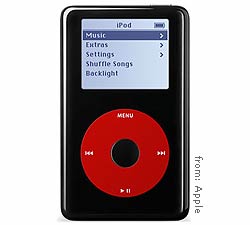Menu
U2, Globalization, and the Identity Trade
U2's Identity Trade: Americanization, Commercialization, and Peace
With their most recent albums All That You Can’t Leave Behind (2000) and How To Dismantle an Atomic Bomb (2004), U2 has redefined their identity within the context of worldwide peacemaking and charity. As a representation of the substance in All That You, the music video for “Stuck in a Moment” depicts an American football game in which the kicker misses a game-winning field goal kick and gets “stuck in the moment” of failure. First of all, this music video is one of two videos made by U2 for the one song, and it clearly caters to the American pop audience. The music video trivializes the meaning of this “moment” by changing it from a general life-altering mistake into a missed field goal, and the use of the favorite American sport of football and an American “hero” like John Madden signifies the band’s increasingly acceptable identification with American culture. Then U2 reached a commercial pinnacle when they partnered with Apple for the release of their newest album How To in 2004.
As one part of the deal, U2 and Island Records allowed Apple to sell iPods (in the above picture) with the new album already loaded in and to use their images and the single “Vertigo” in Apple commercials. According to CNNMoney.com, Bono claimed that the deal “created a crossroads of art, commerce, and technology,” but it seems that artistic expression had very little to do with this commercial agreement. Among other money-making features, the main part of the contract called for U2 and Island Records to grant Apple the exclusive rights to sell the new album online for a short time after the release date. In general terms, U2 sold their identity to Apple so that Apple could then sell merchandise and produce more capital for the band. Moreover, the first four words of “Vertigo,” the distortion-heavy, spiritual pop/rock love song, are “Unos, dos, tres, catorce!” Not only are these numbers not in Gaelic or English, but they are an incorrect Spanish translation of “one, two, three, fourteen.” Therefore, U2’s latest album not only represents the band’s greatest excursion into capitalism and global marketing, but it also represents their continuous attempt to artificially expand their identity to include people of all cultures and nationalities.
At the same time, in accordance with the vague spirituality in Bono’s lyrics, U2 has also incorporated the role of the international peacemaker into its post-nationalist identity through their participation in a plethora of international charity work. As a band, U2 has campaigned for human rights and social justice causes such as Band Aid, Live Aid (and Live Eight), Amnesty International, the ONE Campaign, Save the Music Foundation (The Edge), and DATA (Debt, AIDS, Trade in Africa), among others. Although Bono did not receive a Nobel Peace Prize in 2007, the fact that a pop musician was even considered for the prize reveals that, even if Bono’s sincerity and international identity are calculated or feigned, his (and the band’s) charity work must be producing positive results. From a capitalist perspective, U2’s aid work throughout the world does more than just improve their public image: it spreads the name and music of the band to many people who then purchase their merchandise and albums. In addition, in developed countries, consumers have become more inclined to purchase U2’s music and merchandise (e.g. the brand Product Red which Bono co-founded) if they believe at least a portion of the sales will go towards the band’s charity work. Thus even the “good” work that U2 performs through their campaigning and fundraising can be seen as another tool with which the band can capitalize on their image as champions of peace and attain an even greater international status.
